Recharge on a tech-free escape to the Alps
A cluster of nature-focused retreats are touting a simpler road to wellbeing free of maddening technology. Their refreshing approach sees the return of mountain hikes, nourishing meals and a slower pace.
With biohacking sessions, neurofitness classes and brain bootcamps all the rage, wellness travel has become mind-bogglingly complicated. It might be the greatest irony of our time – that we turn to technology, the very cause of our stress, to combat it when, in fact, what so many of us need is to switch off and slow down. I don’t want to plug in and track every minute and decision throughout my day. Nor do I wish to undertake a battery of diagnostic tests while on holiday – tests which may or may not optimise my longevity. Mostly I need a clean break from the cycle.
You can make all the incremental changes you want, but the only effective way to create actual change in ourselves is to get away from the daily grind. So late last year I booked into Eriro, a new nine-room alpine hideaway perched above the Tyrolean town of Ehrwald in Austria, one of the first towns south of the German border, and set at the foot of the Zugspitze mountain range. The hotel’s whole selling point is to turn back the clock in an entirely different way, to return to a more time-honoured simplicity and resist the need to constantly “do” something.
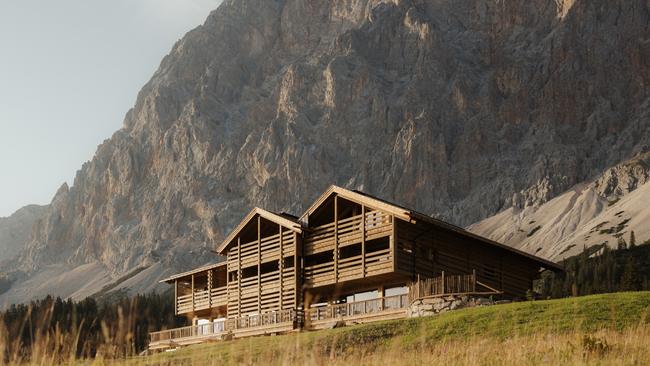
I arrived in the black of night by car, which wound up a narrow dirt road on the mountain, a route still possible in early November before the temperature slides below zero. I’d come via Munich airport, two trains and a car transfer, and felt a little depleted as I pushed the heavy front door open. Inside was all cocooning warmth – a spacious ground-floor lounge clad in timber, with sculptural, custom-made furniture, and floor-to-ceiling windows wrapping around the building.
The February issue of Travel + Luxury Magazine is out today, Friday February 21, in The Australian.
An open fire flickered and beckoned, but I headed straight up to my room (all nine are suites). I clocked the giant free-standing tub by the window and inhaled the sweet smell of pine. Everything was tactile and asked to be touched, from the massive rough-hewn wooden beams overhead to the nubbly hand-knotted rugs underfoot and raw-wool tapestries blanketing one wall. For all arrivals, a welcome snack typical of the region awaits: a wooden platter of regional cheeses and cured meats, house-baked bread, and a cup of herbal tea, next to which was a pair of hand-knitted socks “to be worn throughout my stay”, said the note.
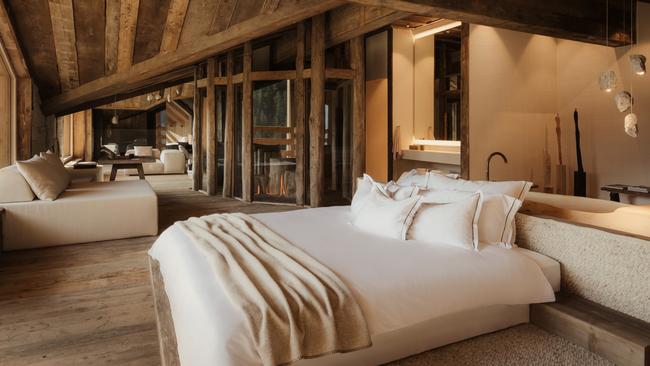
I sank into sleep, too tired to register where I was, but in the morning I pulled back the curtains and stood captivated, admiring the view. A green meadow, still in early-morning shadow, stretched down to meet a mass of pine trees; the sun illuminated the jagged limestone peaks of the mountain range beyond. Low-lying cloud shrouded the valley beyond.
The location of Eriro is impossible to match. The name is derived from the Old High German term “eriro wald”, meaning “at the beginning of the forest”, and it sits at 1550 metres altitude amid meadowlands, just below the mountains’ dense vertical woodlands. It is one of the loftiest accommodation options in the region, and most guests arrive by cable car, which, depending on the season, glides above a blanket of grazing farmlands or a network of ski runs. There are no cars, accommodations, or people, apart from a handful of guests and small groups of hikers who pass along the path behind the hotel. It was dead quiet. And really stunning.
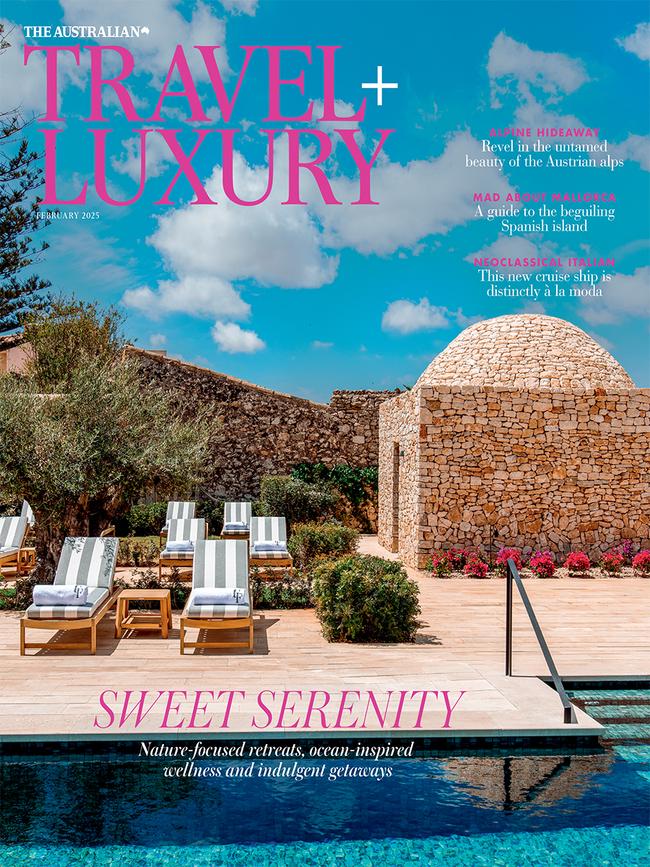
I headed downstairs in my cosy socks to breakfast, another spread of dairy and cured meats, hearty fare authentic to the region. Eriro might be a retreat with a yoga/meditation room and an enticing spa with onsen-style baths, but it is not a high-maintenance health resort. Guests expecting a breakfast of protein smoothies, activated almonds or even avocado toast will be let down. The head chef, David Franken, a German whizz-kid, is a zero-waste militant with a hyperlocal and seasonal menu.
This is not merely marketing spin. In a matter of months, Franken built up a network of 30 local, small-scale organic producers, from the hunter who delivers fresh game to the back door to local octogenarians with excess fruit in their orchards. In summer, the chef heads out into the woods (with guests, if they care to join him) to forage for wild local herbs, such as mint and woodruff, as well as juniper berries and flowers – he harvested 600 kilos of elderflower in June alone.
Franken and his team then spend the autumn months pickling and preserving. Everything on the menu is made from scratch – from the apple pectin for his berry jams to the myriad vinegars, pasta and delicious fresh bread (local wholemeal flour is milled in-house) to the fennel salt, and young plums pickled in brine to replace olives. His larder, a wall covered in rows and rows of jars brimming with flavour, is primed for winter.
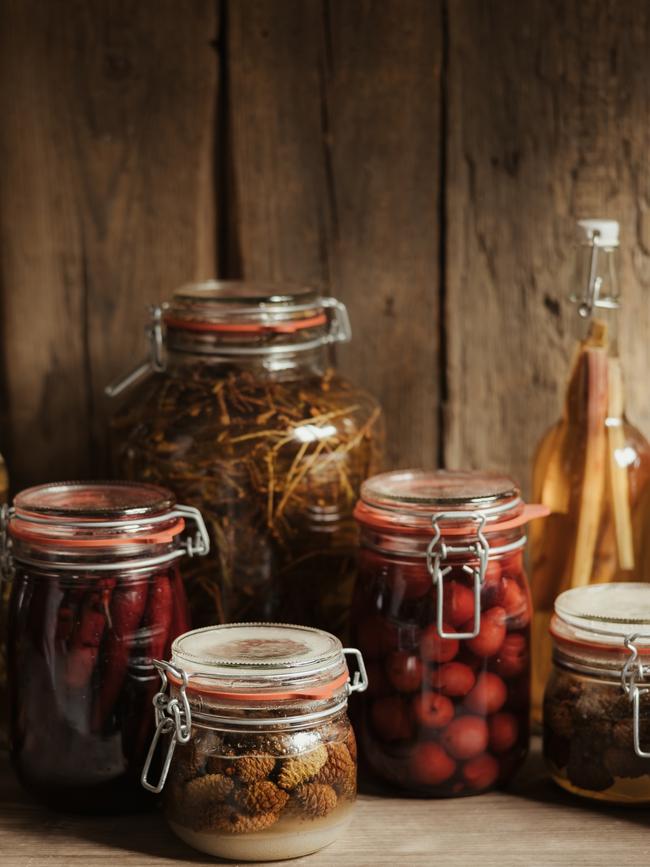
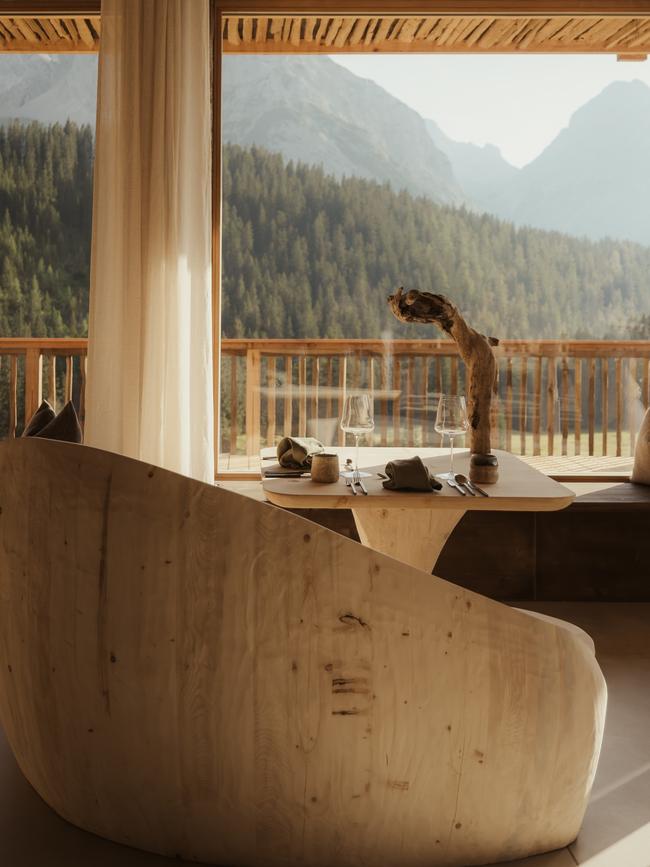
I sampled the best from the region in a single day. Lunch was uncomplicated – a dish of potatoes, bacon, apple and caramelised onion – while dinner was a more elaborate three-course affair: a salad of bitter greens, locally caught wild trout, and a semifreddo of homemade yoghurt infused with elderflower. On the second day, I headed off for a four-hour hike in the hills behind the lodging, and Franken packed me a picnic lunch of semmelknödel – local bread dumplings – which were pure comfort as I took in the breathtaking view of a local lake.
This is the kind of food eaten by the locals’ ancestors, and reflective of a simpler existence before our era of information overload. Indeed, Eriro is the joint project of three local families, conceived as a tribute to their roots and the authentic alpine way of life – immersed in nature and in step with its cycles. The smart building, designed by South Tyrolean architect Martin Gruber, was built by one of the owners, who has a local carpentry business constructing chalets. It follows the same floor plan as a former inn built on the site in the 1930s, working to the existing nine-room licence.
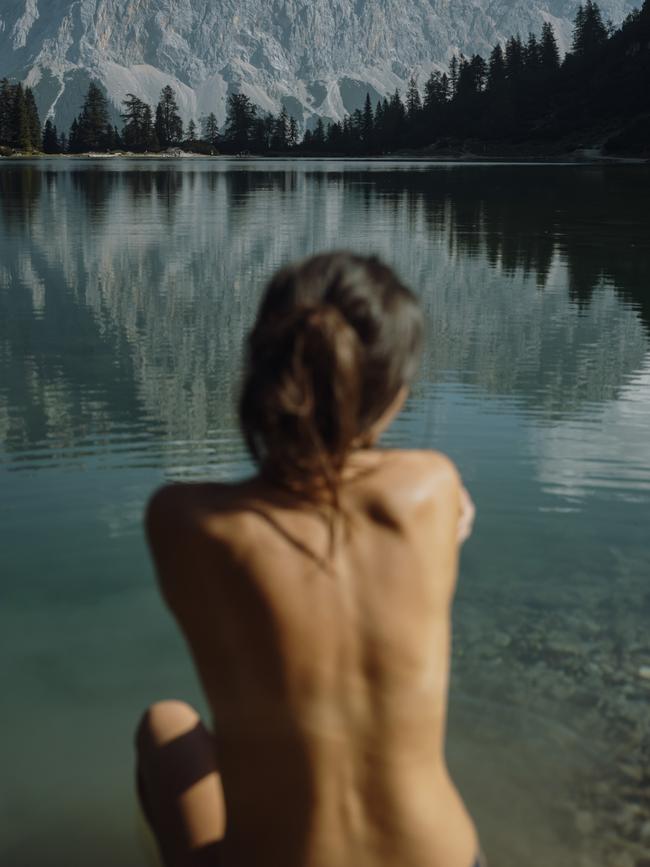
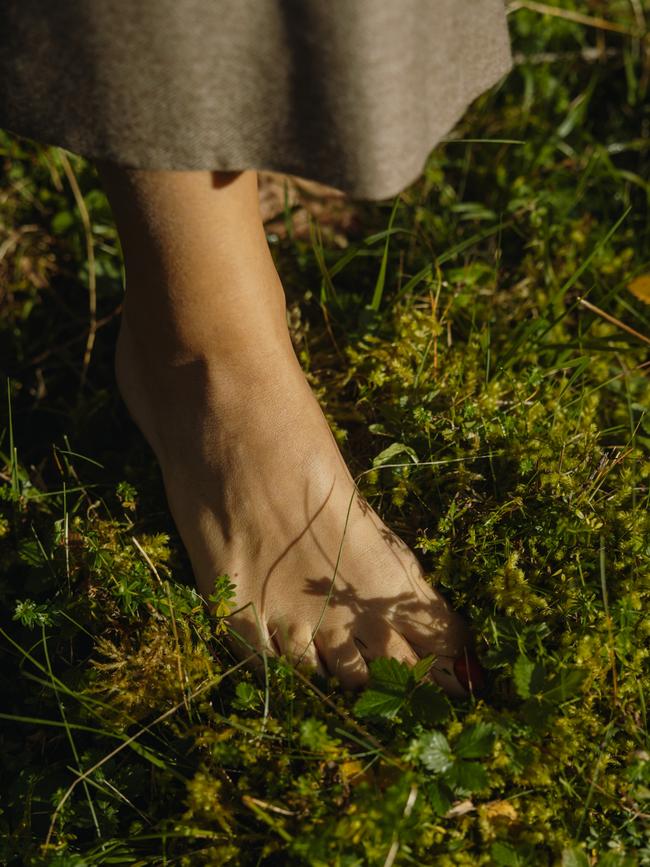
In the pursuit of tradition, deeply ingrained in this community, and the idea of regrounding, guests can work with their hands by doing woodwork and pottery classes. They can also enlist in guided barefoot strolls in mossy forests, yodelling-inspired breathwork sessions and cold-water swimming in the lakes – which the locals probably just call swimming. Some of this seems ludicrously atavistic – manual labour and rustic cosplay in five-star surroundings – but as an antidote to modern life it has meaning. Our disconnection from nature and its life-giving vitality is well documented. We were long overdue for an about-turn.
Over the weekend, I did some pottery, took long walks, bathed, and luxuriated in a sauna with a floor-to-ceiling window overlooking the valley. At home, I live so much in my head, a static body and overactive mind consumed by devices all day, and time seems to slip through my fingers. Just taking in the view each time was enough to stop me in my tracks, to slow down and smell the woody scents. I’ll likely never know what it is to wake up to this every day, and perhaps I would become apathetic over time, but as a way to reset it feels transformative.
The writer was a guest of Eriro. eriro.at
HOLISTIC HIDEAWAYS
Four more resorts and hotels to reconnect with nature and disconnect from the world
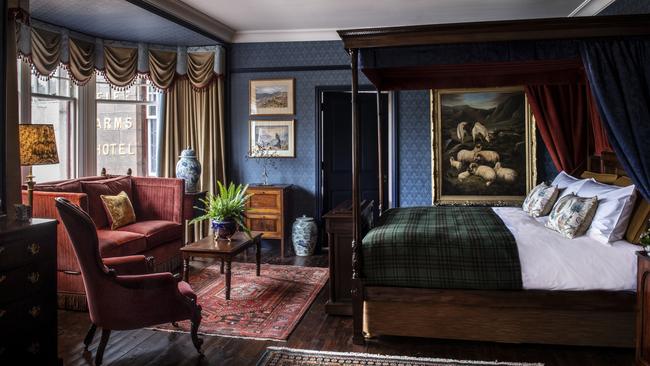
The Fife Arms, Scotland: Since it was reopened in 2018 by Iwan and Manuela Wirth of art gallery Hauser & Wirth, this bolthole in Braemar has become a destination for the international art crowd and jet-set, yet outdoorsy travel enthusiasts and nature lovers will feel equally at home. Amid the splendour of Cairngorms National Park, the hotel has a dedicated “wild wellness” program, led by the local naturalist Annie Armstrong, who takes guests on guided walks and wild-swimming adventures that finish up in a cosy, riverside wood-fired sauna. thefifearms.com
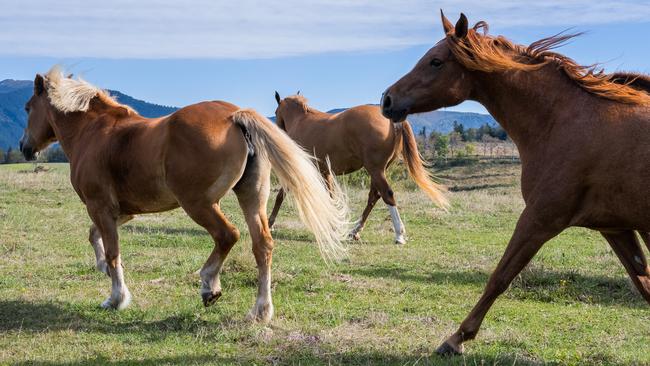
Oasyhotel, Italy: This is a back-to-nature escape in the wild heart of Tuscany. The hotel has two restaurants and 16 spacious, modern timber lodges surrounded by woodlands that are home to diverse wildlife, including wolves and deer. Guests can enlist in a variety of activities, such as swimming and kayaking in the on-site lake, guided walks, stargazing, yoga, horseback-riding, beekeeping, and cheesemaking. The lodging offers numerous all-inclusive packages to reduce decision-making fatigue. It represents a novel take on a rustic Italian idyll. oasyhotel.com
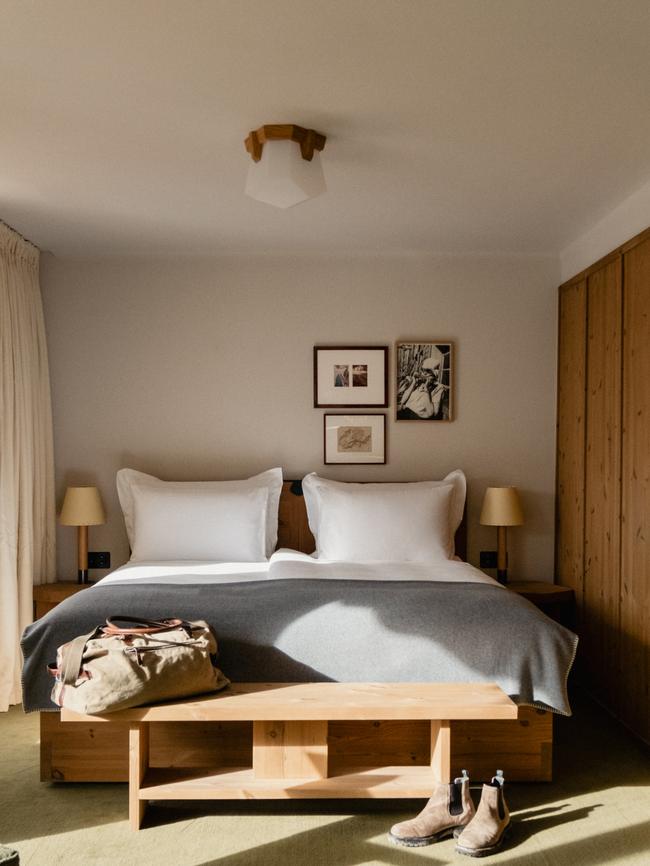
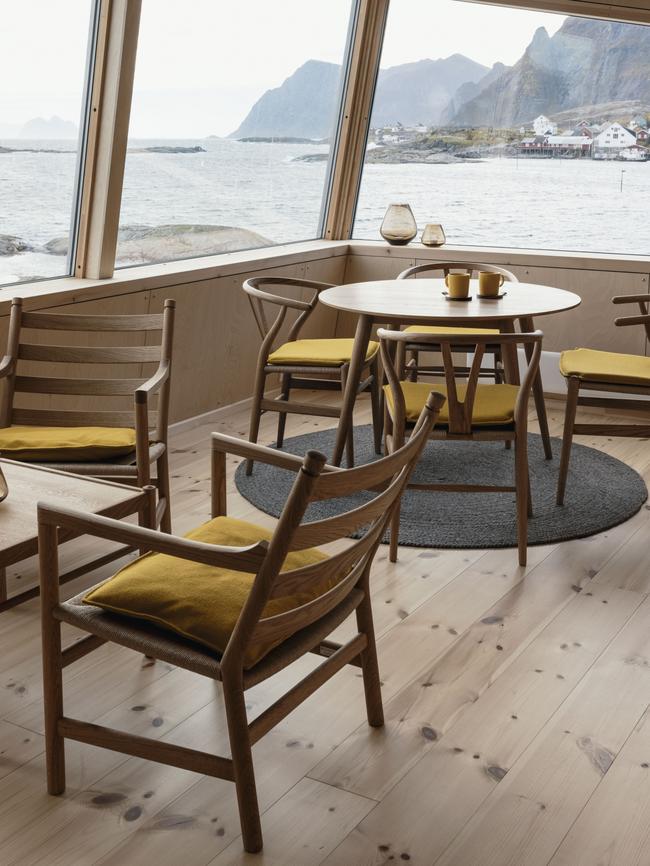
The Grand Hotel Belvedere, Switzerland: Set in the pedestrianised village of Wengen, in Switzerland’s Lauterbrunnen Valley, this 90-room, Art Nouveau-style institution has been given a facelift by Beaumier. Austrian holistic skincare and spa expert Susanne Kaufmann heads up its newly built spa, which has alpine-inspired treatments, a hammam and onsen-like indoor and outdoor infinity pools. In the summer, guests can partake in forest yoga, foraging, hiking and canyoning, while winter sports will increase your heart rate, with snowshoeing and skiing. beaumier.com
Holmen Lofoten: If you’re looking for a dramatic change of scenery, consider travelling far north to this hotel on Norway’s Lofoten archipelago in the Arctic. This unique destination consists of restored rorbuer, or fishermen’s cabins, positioned right on the coast near towering mountains, wild seas, and colourful, quaint fishing villages. Its restaurant is a culinary destination, and many activities revolve around epicurean experiences, including foraging, fishing trips, and cooking classes. The suites have sea views and saunas – so you can still take it all in without braving the elements. holmenlofoten.no
This story is from the February issue of Travel + Luxury Magazine.


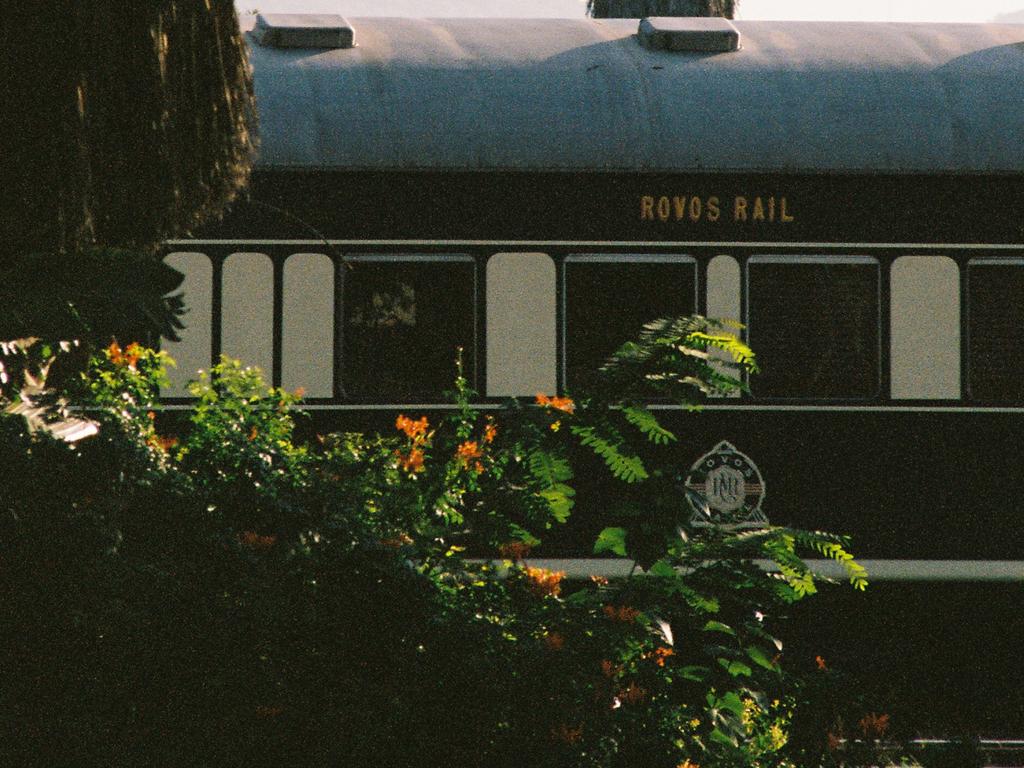
To join the conversation, please log in. Don't have an account? Register
Join the conversation, you are commenting as Logout